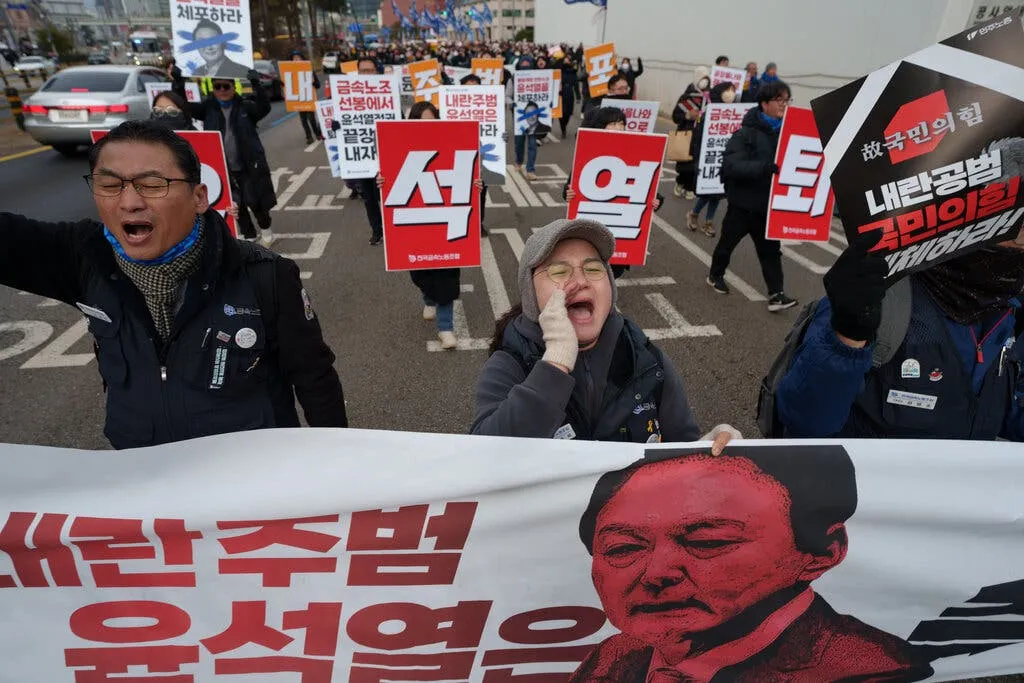South Korea’s President Yoon Impeached: A Political Earthquake Unfolds
In a seismic political moment that will reshape South Korea’s democratic landscape, the National Assembly has voted to impeach President Yoon Suk-yeol, marking an unprecedented crisis in the nation’s recent political history. The dramatic vote on December 14, 2024, sends shockwaves through the country’s political establishment and raises critical questions about the future of South Korean governance.
The Impeachment Breakdown
The impeachment motion passed with overwhelming support from the opposition bloc, who secured the critical threshold of votes needed to challenge the president’s authority. With 192 seats already in their control, the opposition managed to garner additional support from defecting members of Yoon’s own People Power Party.
Key Factors Leading to the Vote
The primary catalyst for this extraordinary political action was President Yoon’s controversial declaration of martial law on December 3, 2024. This unprecedented move triggered:
- Massive nationwide protests
- Widespread public unrest
- Significant political backlash
- Constitutional challenges to presidential power
Presidential Response and Legal Battle
In a defiant televised address, President Yoon categorically rejected calls for his resignation. “I will continue to serve the people of South Korea and defend the constitutional principles of our democracy,” he proclaimed, signaling his intention to fight the impeachment through legal channels.
Constitutional Court Showdown
The impeachment process now moves to the Constitutional Court, where a critical threshold must be met:
- At least 6 out of 9 justices must support the motion
- Yoon will argue his martial law declaration was a legitimate exercise of presidential power
- Legal experts anticipate a complex and potentially prolonged constitutional battle
Potential Political Consequences
If the impeachment is ultimately upheld, South Korea will experience significant political transitions:
- Prime Minister Han Duck-soo will assume the role of acting president
- A new presidential election must be held within 60 days
- Yoon would lose all presidential privileges and protections
Historical Context
This is not unprecedented in South Korean politics. The country has a complex history of presidential impeachments, including:
- President Roh Moo-hyun’s impeachment in 2004
- President Park Geun-hye’s removal from office in 2017
Broader Implications
The political crisis extends beyond domestic politics, potentially impacting:
- South Korea’s economic stability
- Regional diplomatic relationships
- International perception of the country’s democratic institutions
Public Sentiment
The nation remains deeply divided, with passionate protests both supporting and opposing the impeachment. This reflects the profound political polarization currently gripping South Korean society.
Looking Forward
As the Constitutional Court prepares to review the impeachment motion, the entire nation holds its breath. The outcome will not only determine President Yoon’s political fate but potentially reshape South Korea’s political landscape for years to come.
The world watches and waits.
Final Observations
While the impeachment process unfolds, one thing remains clear: South Korea’s democratic institutions are being tested in real-time, demonstrating both the fragility and resilience of its political system.
Disclaimer: This article is based on current reporting and may be subject to updates as the situation develops.
Reporting from Seoul, with contributions from international news sources.






Leave a Comment